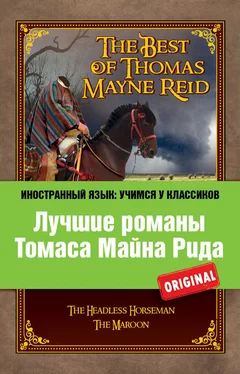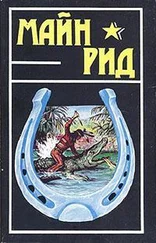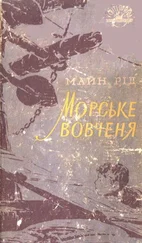“Yesh,” he continued, striking the ferrule of his umbrella against the floor, “theesh are the very fellows for the shob – worth a shcore of Shakra’s shpells, and hish bottles to boot! There ish no fear that their medishin will fail. S’help me, no! Now, ash I think of it,” continued he, “that ish the plan – the very besht. There ish no other safe and sure, like that ish. Ha! Cushtos! you shan’t eshcape yet. Ha! Shoodith, mine girl, you ish welcome to your way; you shall have the young man after all!”
On giving utterance to these ambiguous speeches, the Jew dropped back into his chair, and sat for some minutes in silent but earnest meditation.
The matter of his meditation may be known by the act that followed.
“There ishn’t an hour to be losht!” muttered he, starting to his feet, and hurriedly making for the door; “no, not ash much ash a minute. I musht see them now. The Cushtos ish to shtart at sunrishe. The wench hash said it. They’ll joosht have time to get upon hish track. S’help me,” he added, opening the door, and glancing up at the sky, “ash I live, it’sh mosht sunrishe now!”
Sticking his beaver firmly upon his head, and taking a fresh clutch of the everlasting umbrella, he rushed rapidly out of the verandah, crossed the courtyard, re-passed the porter at his own gate, and then traversing the little enclosure outside, stood in the open fields.
He did not stand long – only to look around him, and see that the ground was clear of stragglers.
Satisfied on this head, he proceeded onward.
At the distance of some three or four hundred yards from the outside stockade stood a detached cabin, more than half hidden among the trees.
Towards this he directed his steps.
Five minutes sufficed for him to reach it; and, on arriving at the door, he knocked upon it with the butt of his umbrella.
“ Quien es ?” spoke a voice from within.
“It’sh me, Manuel – me – Shessuron!” replied the Jew.
“It’s the Dueno ,” (master), was heard muttering one of the Spaniards to the other – for the cabin was the dwelling of these notable negro-hunters.
“ Carajo ! what does the old ladron want at this hour?” interrogated the first speaker, in his own tongue, which he knew was not understood by the Jew. “ Maldito !” added he, in a grumbling voice; “it’s not very pleasant to be waked up in this fashion. Besides, I was dreaming of that yellow-skin that killed my dogs. I thought I had my macheté up to the hilt in his carcase. What a pity I was only dreaming it!”
“ Ta-ta !” interrupted the other; “be silent, Andres. The old ganadero is impatient. Vamos ! I’m coming, Señor Don Jacob!”
“Make hashte, then!” answered the Jew from without. “I hash important bishness with both of yoush.”
At this moment the door opened; and he who answered to the name of Manuel appeared in the doorway.
Without waiting for an invitation, Jessuron stepped inside the cabin.
“Does your business require a candle, señor?” inquired the Spaniard.
“No – no!” answered the Jew, quickly and impressively, as if to prevent the striking of a light. “It ish only talk; we can do it in the darknesh.”
And darkness, black and profound, was most appropriate to the conversation that followed. Its theme was murder – the murder of Loftus Vaughan!
The plan proposed was for the two Spaniards – fit instruments for such purpose – to waylay the Custos upon the road – in some dark defile of the forest – anywhere – it mattered not, so long as it was on this side of Spanish Town.
“Fifty poundsh apeesh; goot Island currenshy,” was the reward promised – offered and accepted.
Jessuron instructed his brace of entrepreneurs in all the details of the plan. He had learnt from Cynthia that the Custos intended to take the southern road, calling at Savanna-le-Mer. It was a roundabout way to the capital; but Jessuron had his suspicions why that route had been chosen. He knew that Savanna was the assize town of Cornwall; and the Custos might have business there relating to himself, Prince Cingües, and his two dozen Mandingoes!
It was not necessary to instruct the caçadores in these multifarious matters. There was no time to spend on any other than the details of their murderous plan; and these were made known to them with the rapidity of rapine itself.
In less than twenty minutes from the time he had entered the cabin the Jew issued out again, and walked back, with joyous mien and agile step, towards his dark dwelling.
Chapter 35
Stalking the Sleeper
Cubina, on arriving near the precincts of the penn, moved forward with increased caution. He knew that the penn-keeper was accustomed to keep dogs and night-watchers around his enclosure, not only to prevent the cattle and other quadrupeds from straying, but also the black bipeds that filled his baracoons.
The Maroon was conscious, moreover, that his own attitude towards the slave-merchant was, at this time, one of extreme hostility. His refusal to restore the runaway had been a declaration of open war between them; and the steps he had since taken in conjunction with the Custos – which he now knew to be no longer a secret to the slave-stealer – could not otherwise than render him an object of the Jew’s most bitter hatred.
Knowing all this, he felt the necessity of caution in approaching the place: for should the penn-keeper’s people find him prowling about the premises, they would be certain to capture him, if they could, and carry him before Jacob Jessuron, J.P., where he might expect to be treated to a little “justice’s justice.”
With this prospect before him, in the event of being detected, he approached the Jew’s dwelling as cautiously as if he had been a burglar about to break into it.
It was towards the back of the house that he was advancing from the fields – or rather, the side of it, opposite to that on which lay the cattle and slave enclosures.
He had made a short circuit to approach by this side, conjecturing that the others would be more likely to be guarded by the slave and cattle watchers.
The fields, half returned to the condition of a forest, rendered it easy to advance under cover. A thick, second growth of logwood, bread-nut, and calabash trees covered the ground; and nearer the walls the old garden, now ruinate, still displayed a profusion of fruit-trees growing in wild luxuriance, such as guavas, mangoes, paw-paws, orange and lemon, sops, custard-apples, the akee, and avocada pear. Here and there a cocoa-palm raised its tufted crown far above the topmost spray of the humbler fruit-trees, its long, feathery fronds gently oscillating under the silent zephyrs of the night.
On getting within about a hundred yards of the house Cubina formed the intention not to go any nearer just then. The plan he had traced out was to station himself in some position where he could command a view of the verandah – or as much of it as it was possible to see from one place. There he would remain until daybreak.
His conjecture was, that Herbert Vaughan would make his appearance as soon as the day broke, and this was all the more probable on account of his engagement with the Maroon himself.
The protégé of Jessuron would show himself in the verandah on leaving his chamber. He could not do otherwise, since all the sleeping-rooms – and Cubina knew this – opened outward upon the gallery.
Once seen, a signal by some means – by Cubina showing himself outside, or calling the young Englishman by name – would bring about the desired interview, and hasten the execution of the project which the Maroon had conceived.
Читать дальше
Конец ознакомительного отрывка
Купить книгу











